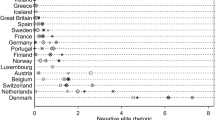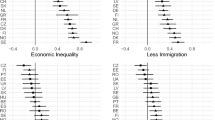Abstract
Although previous studies have concluded that, in comparative terms, Portuguese citizens exhibit low levels of social, value and partisan left-right attitude anchoring, the truth is that the items used in these studies are rather limited. Moreover, the meaning attributed by voters to each ideological camp was never studied. This study seeks to overcome these limitations. The article reiterates that in a comparative perspective, Portugal does exhibit low levels of left-right attitude anchoring. This is the point of departure of the article and also, it is argued, a good reason to try to further understand this case and extract from it inferences about similar cases. One of this study's major findings is that the meanings attributed to the left-right divide are not clear and structured; moreover, this lack of clarity is positively correlated with low levels of media exposure, education and left-right self-placement. Although the article tests hypotheses about how different groups (manual workers versus other social classes; older versus younger cohorts; post-materialists versus other value groups) might give different meanings to the left-right divide, the major finding is that media exposure and education are in any case the crucial factors explaining the more or less structured meanings for ideological conflicts.
Similar content being viewed by others

Notes
For further information, see www.cies.iscte.pt.
Please note that the factors that determine the differences between Portugal (along with Austria, Belgium and Ireland) and the majority of the West European countries analysed in Table 1 are above all the lower level of anchoring of individual left-right self-placement on social factors, partisan loyalties and value orientations, especially the latter element. The differences are of strength not direction of the relationships (see Freire, 2008).
We used the following standard question (like in EVS 1999) to measure materialist and post-materialist value orientations ‘There is a lot of talk these days about what the aims of this country should be for the next ten years. If you had to choose, which of the things would you say is most important? And which would be the next most important? (First Choice and Second Choice) Maintaining order in the nation; Giving people more say in important government decisions; Fighting rising prices; Protecting freedom of speech; Don’t know; No answer’.
References
Benoit, K. and Laver, M. (2006) Party Policy in Modern Democracies. London: Routledge.
Budge, I., Klingemann, H.-D., Volkens, A., Bara, J. and Tanenbaum, E. (eds.) (2001) Mapping Policy Preferences. Estimates for Parties, Electors and Governments 1945–1998. Oxford, UK: Oxford University Press.
Converse, P. (1964) The nature of belief systems in mass publics. In: D. Apter (ed.) Ideology and Discontent. New York: Free Press, pp. 206–261.
Converse, P. and Pierce, R. (1986) La gauche et la droite. In: P. Converse and R. Pierce (eds.) Political Representation in France. Cambridge, MA: Harvard University Press, pp. 111–150.
Dalton, R. (2006) Social modernization and the end of ideology debate: Patterns of ideological polarization. Japanese Journal of Political Science 7 (1): 1–22.
Van der Eijk, C., Schmitt, H. and Binder, T. (2005) Left-right orientations and party choice. In: J. Thomassen (ed.) The European Voter: A Comparative Study of Modern Democracies. Oxford, UK: Oxford University Press, pp. 167–191.
Flanagan, S. and Lee, A.-R. (2003) The new politics, culture wars, and the authoritarian-libertarian value change in advanced industrial democracies. Comparative Political Studies 36 (3): 235–271.
Freire, A. (2006a) Esquerda e Direita na Política Europeia. Portugal, Espanha e Grécia em Perspectiva Comparada, Lisbon: Imprensa de Ciências Sociais.
Freire, A. (2006b) Bringing social identities back in: The social anchors of left-right orientation in Western Europe. International Political Science Review 27 (4): 359–378.
Freire, A. (2006c) Left-right ideological identities in new democracies: Greece, Portugal and Spain in the Western European context. Pôle Sud: Revue de Science Politique de l’Europe Méridionale II (25): 153–173.
Freire, A. (2008) Party polarization and citizens’ left-right orientations. Party Politics 14 (2): 189–209.
Fuchs, D. and Klingemann, H.-D. (1990) The left-right schema. In: M.K. Jennings and J. Van Deth (eds.) Continuities in Political Action: A Longitudinal Study of Political Orientations in Three Western Democracies. Berlin, Germany: deGruyter, pp. 203–234.
Herrera, R. (1999) The language of politics: A study of elite and mass understandings of ideological terminology in the United States and the Netherlands. In: W. Miller, R. Pierce, J. Thomassen, R. Herrera, S. Holmberg, P. Esaiasson, B. Wessels (eds.) (orgs.) Policy Representation in Western Democracies. Oxford and New York: Oxford University Press, pp. 59–86.
Heywood, A. (2003) Political Ideologies: An Introduction. Basingstoke, UK: Palgrave Macmillan.
Huber, J. (1989) Values and partisanship in left-right orientations: Measuring ideology. European Journal of Political Research 17: 599–621.
Inglehart, R. (1984) The changing structure of political cleavages in western society. In: R. Dalton, S. Flanagan and P. Beck (eds.) Electoral Change in Advanced Industrial Democracies: Realignment or Dealignment? New Jersey: Princeton University Press, pp. 25–69.
Inglehart, R. and Klingemann, H.-D. (1976) Party identification, ideological preference and the left-right dimension among Western mass publics. In: I. Budge, I. Crewe and D.J. Fairlie (eds.) Party Identification and Beyond. London: John Wiley, pp. 243–276.
Kitschelt, H. (1994) The Transformation of European Social Democracy. Cambridge: Cambridge University Press.
Knutsen, O. (1997) The partisan and the value-based components of left-right self-placement: A comparative study. International Political Science Review 18: 191–225.
Laponce, J.A. (1981) Left and Right: The Topography of Political Perceptions. Toronto, Canada: University of Toronto Press.
Sani, G. and Montero, J.R. (1986) El espectro político: izquierda, derecha y centro. In: J. Linz and J.R. Montero (eds.) Crisis y Cambio: Electores y Partidos en la España de los Años Ochenta. Madrid, Spain: Centro de Estudios Constitucionales, pp. 155–200.
Sani, G. and Sartori, G. (1983) Polarization, fragmentation and competition in Western democracies. In: H. Daalder and P. Mair (eds.) Western European Party Systems: Continuity and Change. London: Sage, pp. 307–340.
Zaller, J. (1992) The Nature and Origins of Mass Opinion. Cambridge: Cambridge University Press.
Author information
Authors and Affiliations
Corresponding author
Rights and permissions
About this article
Cite this article
Freire, A., Belchior, A. What left and right means to Portuguese citizens. Comp Eur Polit 9, 145–167 (2011). https://doi.org/10.1057/cep.2009.14
Published:
Issue Date:
DOI: https://doi.org/10.1057/cep.2009.14



